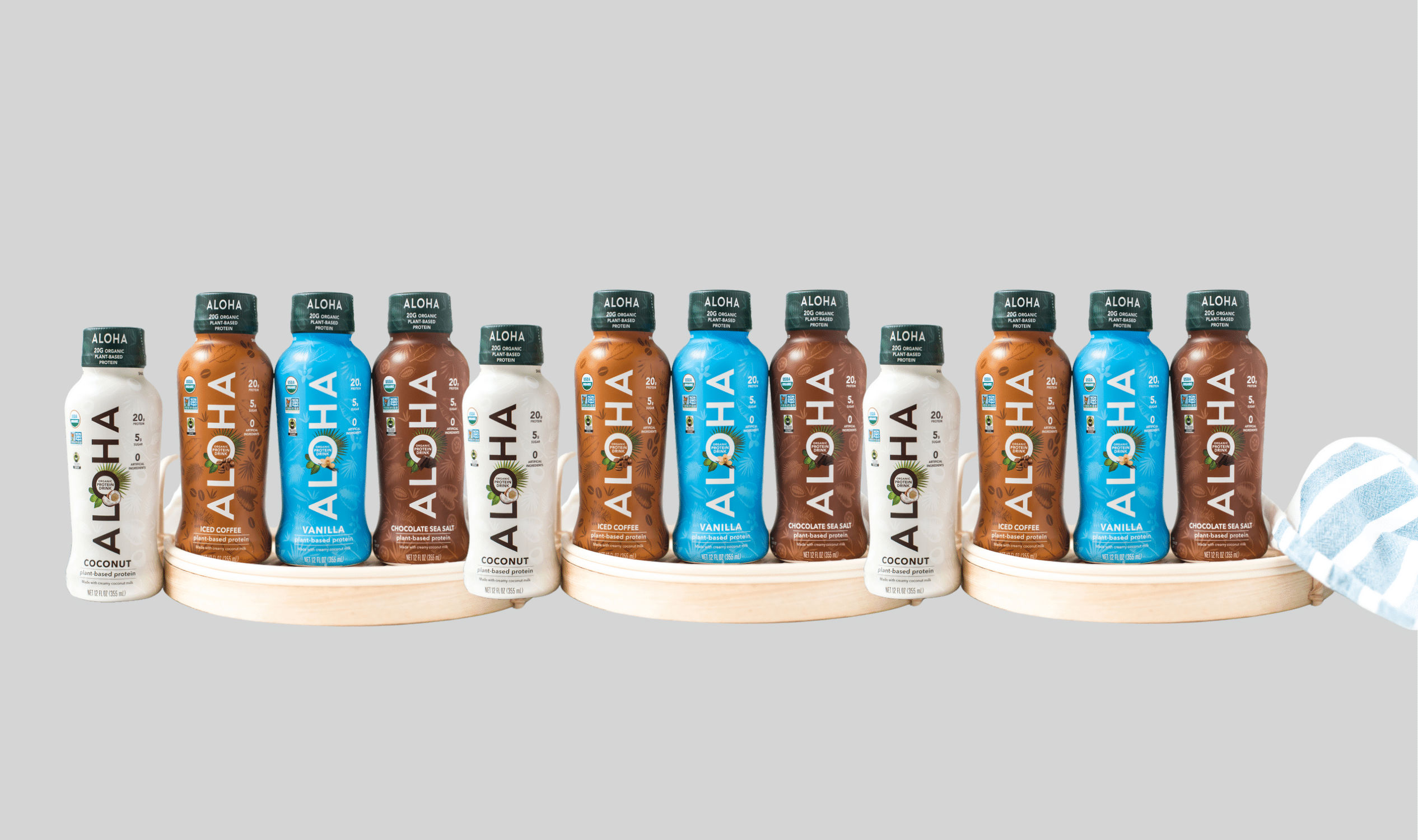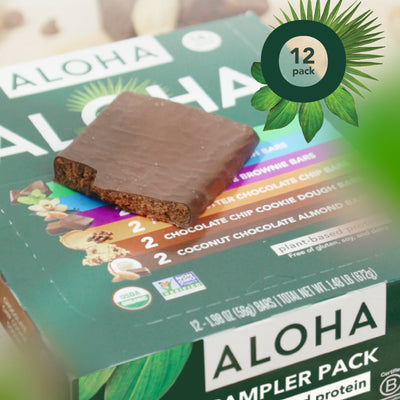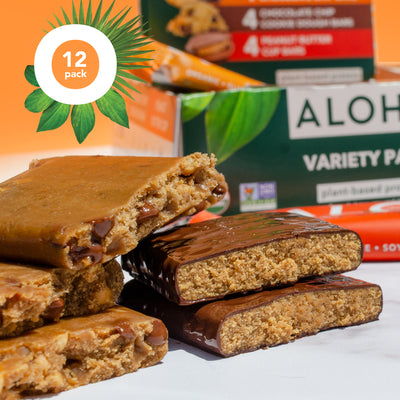Key Takeaways:
- Plant-Based Protein Benefits: Plant-based protein shakes are lower in sugar, higher in fiber, and easier to digest, making them ideal for diabetics.
- Choosing Safe Protein Shakes: Opt for protein shakes that are low in sugar and rich in fiber to avoid blood sugar spikes and support long-lasting energy.
- Consult Your Healthcare Provider: Always consult a healthcare provider before adding protein shakes to your diet to ensure they fit your diabetes management plan.
At ALOHA, we’re more than just a protein brand—we’re your trusted source for organic, plant-based, non-GMO nutrition. With our commitment to clean, simple ingredients, we make healthy eating both easy and delicious.
For those managing diabetes, the question often arises: Are protein shakes good for diabetics? With so much mixed advice, it’s understandable to feel uncertain. But finding the right nutritional options doesn’t have to be complicated.
In this article, we’ll explore whether protein shakes can be a valuable addition to a diabetes-friendly lifestyle, looking at their effects on blood sugar and overall health. We’ll dive into the benefits of plant-based options and offer tips for selecting the best shake for diabetes management.
Understanding Diabetes And Dietary Needs
Living with diabetes means paying special attention to your diet, as it plays a crucial role in managing blood sugar levels. Carbohydrates, fats, and proteins all impact your glucose levels differently, so knowing what works best for your body is crucial. For people with diabetes, balancing blood sugar means focusing on foods that release energy steadily without causing spikes.
Protein is an essential nutrient because it helps keep you feeling full and supports muscle health, all while having little effect on blood sugar. However, not all proteins are created equal. Choosing the right source, especially one that’s easy to digest and provides additional health benefits, can make a big difference in managing diabetes successfully.
The Role Of Protein In Managing Diabetes
Protein is crucial in managing diabetes by helping regulate blood sugar levels and maintaining muscle mass, essential for overall health. Unlike carbohydrates, protein doesn’t cause sharp spikes in glucose, making it a more stable option for people with diabetes. Including sufficient protein in meals can slow down the absorption of sugar, preventing those sudden rises and falls in blood glucose that many people with diabetes struggle with.
For those managing diabetes, protein-rich foods also provide longer-lasting energy, which can help reduce cravings and support weight management. When choosing protein, plant-based options like those found in ALOHA offer the added benefits of being lower in unhealthy fats and rich in fiber, which is also beneficial for blood sugar control.
Are Protein Shakes Safe For Diabetics?
Protein shakes can be a great addition to a diabetic’s diet, but their safety depends largely on the ingredients. Many store-bought shakes contain high levels of added sugars, which can lead to rapid blood sugar spikes—something people with diabetes need to avoid. That’s why it’s essential to read labels carefully and opt for shakes that are low in sugar and made with natural, wholesome ingredients.
Plant-based protein shakes are often a safer option for diabetics. They are free from added sugars and packed with fiber and healthy fats, which can support better blood sugar control. Combining fiber and protein helps slow digestion, providing a steady release of energy rather than a spike in glucose.
Additionally, protein shakes may benefit diabetics who struggle to meet their daily protein intake through food alone. They offer a convenient, easy-to-digest source of protein that helps stabilize blood sugar without adding unnecessary carbs or unhealthy fats. As long as people with diabetes choose the right shake, these beverages can be a helpful tool in maintaining balanced nutrition and managing diabetes effectively.
Potential Benefits Of Plant-Based Protein Shakes For Diabetics
Plant-based protein shakes can be especially beneficial for diabetics due to their unique nutritional profile. Unlike many dairy-based options, plant-based shakes are often low in sugar and high in fiber, making them ideal for maintaining balanced blood sugar levels. Let’s explore the specific benefits of plant-based shakes in more detail:
Lower Sugar And Higher Fiber
Plant-based protein shakes naturally contain lower sugar levels than many other types. This is essential for people with diabetes who need to avoid sudden glucose spikes. The high fiber content in plant-based proteins further aids in slowing digestion, ensuring a more controlled and gradual release of sugar into the bloodstream.
Nutrient-Dense And Packed With Benefits
Besides being rich in protein, plant-based shakes like those made with pea or hemp protein offer additional health benefits. They are often loaded with vitamins, minerals, and antioxidants that support immune function and overall health. This makes them a great way for diabetics to meet their nutritional needs without sacrificing taste or adding empty calories.
Easy To Digest And Free From Common Allergens
Many people with diabetes also experience food sensitivities, especially to lactose. Plant-based protein shakes are free from common allergens like dairy and soy, making them easier to digest. This means they can enjoy a protein shake without worrying about digestive issues or inflammation from dairy-based products.
Plant-Based Shakes Promote Heart Health
Many plant-based shakes are rich in healthy fats, like omega-3s from flaxseed or chia. These fats support heart health, which is particularly important for people with diabetes, who are at higher risk for cardiovascular issues. Incorporating healthy fats also helps maintain energy without raising blood sugar.
Rich In Antioxidants And Phytonutrients
Plant-based ingredients, such as peas, hemp, and brown rice, are often packed with antioxidants and phytonutrients. These compounds support immune function and reduce inflammation, which is crucial for people with diabetes aiming to maintain overall well-being. This makes plant-based shakes a nourishing option for improving blood sugar control and long-term health.
Choosing The Right Protein Shake For Diabetes Management
Choosing the right protein shake is crucial for effective diabetes management. With so many options available, people with diabetes should focus on shakes that are low in sugar, high in fiber, and free from artificial ingredients. It’s also important to consider the protein source—plant-based options offer additional benefits like easier digestion and heart-healthy fats, making them a better choice. Here are some factors to consider when selecting the best protein shake for diabetes:
Check For Added Sugars
For people with diabetes, avoiding shakes with added sugars is critical to maintaining stable blood sugar levels. Many protein shakes on the market can contain hidden sugars, leading to unexpected glucose spikes. Opt for products with little to no added sugar and look for natural sweeteners like monk fruit, which won’t affect blood sugar.
Focus On Fiber Content
Fiber is critical in blood sugar management, as it helps slow digestion and glucose absorption. Shakes rich in fiber can help diabetics feel fuller for longer and prevent blood sugar fluctuations. Plant-based shakes often contain higher fiber, making them an excellent option for maintaining satiety and stable blood sugar.
Look For High-Quality, Plant-Based Proteins
Plant-based proteins provide a cleaner, more digestible source of protein without the cholesterol and unhealthy fats that often come with animal-based products. These proteins support muscle health and contribute to better digestion and nutrient absorption, making them a great choice for diabetics.
Consult With A Healthcare Provider
Consulting with a healthcare provider is crucial when considering protein shakes as part of a diabetic diet. While these shakes can offer many benefits, such as aiding in blood sugar control and providing essential nutrients, it’s important to ensure they fit your dietary needs. A healthcare professional can assess your current health, monitor changes, and recommend specific shakes that won’t interfere with your medication or blood sugar levels.
Each person’s diabetes management plan is unique, and what works for one person may not be appropriate for another. A doctor or dietitian can help you understand how much protein is suitable for your body and how it might interact with other aspects of your diet. They can also help you track how your body responds to different protein shakes and guide you in making informed choices.
Additionally, a healthcare provider can assist in identifying any potential allergens or sensitivities to ingredients found in certain protein shakes. For example, if you have issues with lactose or soy, they can recommend alternatives that are easier for your body to process. This personalized approach ensures that protein shakes can be safely integrated into your daily routine while supporting overall health goals.
Final Thoughts
When considering whether protein shakes are suitable for diabetics, it is essential to focus on quality ingredients and how they fit into a balanced diet. Protein shakes, particularly plant-based options, offer a convenient way to support blood sugar management, but not all shakes are created equal. Choosing options that are low in added sugars and rich in fiber can provide steady energy while promoting overall health.
Managing diabetes is about making informed choices that align with your specific dietary needs. Incorporating protein shakes into your routine can be a positive step toward better blood sugar control and nutrition, especially when prioritizing clean, nutrient-dense ingredients. As with any dietary adjustment, it’s always wise to consult with a healthcare provider to ensure the best outcomes for your personal health journey.
Read also:
- How To Make A Protein Shake: Delicious Recipes And Tips
- Protein Powder vs. Protein Shake: Understanding The Differences
- Vegan Vs Dairy-Free: What Does Vegan Really Mean?
Frequently Asked Questions About Are Protein Shakes Good For Diabetics
Can protein shakes help regulate blood sugar levels in diabetics?
Yes, protein shakes can help regulate blood sugar, particularly when they are low in sugar and high in protein and fiber. Plant-based options are ideal since they digest slowly, providing a steady release of energy without causing sharp glucose spikes.
Are there specific ingredients diabetics should avoid in protein shakes?
People with diabetes should avoid shakes that contain added sugars, artificial sweeteners, and high-carb fillers, as these can lead to rapid blood sugar spikes. Instead, look for protein shakes sweetened with natural, low-glycemic alternatives like monk fruit.
How do plant-based protein shakes benefit diabetics?
Plant-based protein shakes benefit diabetics by offering a low-sugar, high-fiber option that supports stable blood sugar levels. They are also rich in healthy fats and antioxidants, further aiding overall health and diabetes management.
Can protein shakes be used as meal replacements for diabetics?
Protein shakes can be used as meal replacements if they are well-balanced with protein, fiber, and healthy fats to provide sustained energy. However, it’s essential to consult a healthcare provider to ensure the shake meets your nutritional needs and doesn't cause blood sugar spikes.
Are protein shakes safe for all people with diabetes?
While protein shakes can be safe for most diabetics, it's essential to choose shakes that are low in sugar and free from artificial ingredients. Consulting with a healthcare provider is recommended to ensure the shakes align with your dietary requirements and medication.
Is there an optimal time for diabetics to consume protein shakes?
People with diabetes can consume protein shakes as a snack between meals or as part of breakfast to help maintain stable blood sugar throughout the day. Timing may vary depending on individual needs, so discussing with a healthcare provider is helpful for personalized advice.
Do protein shakes raise blood sugar?
Protein shakes that contain added sugars or high-carb ingredients can raise blood sugar levels. To avoid this, diabetics should choose low-sugar options that provide slow-digesting protein and fiber, helping to maintain stable glucose levels.
What types of protein are best for people with diabetes?
Plant-based proteins such as pea, hemp, and brown rice are excellent for people with diabetes because they are low in sugar, high in fiber, and promote better digestion. These options also provide additional nutrients, such as healthy fats and antioxidants.
Can protein shakes help diabetics with weight management?
Yes, protein shakes can support weight management by providing a filling, low-calorie option that curbs hunger and reduces cravings. This especially benefits diabetics, as maintaining a healthy weight can improve blood sugar control.
Should diabetics avoid dairy-based protein shakes?
Some people with diabetes may need to avoid dairy-based protein shakes if they are lactose intolerant or if they contain added sugars. Plant-based shakes are often a better alternative, as they are easier to digest and generally lower in sugar.
Sources:
- Reynolds, A., & Mitri, J. (2024, April 28). Nutritional recommendations for individuals with diabetes. Nih.gov; MDText.com, Inc. https://www.ncbi.nlm.nih.gov/books/NBK279012/
- McMacken, M., & Shah, S. (2017). A plant-based diet for the prevention and treatment of type 2 diabetes. Journal of Geriatric Cardiology : JGC, 14(5), 342–354. https://doi.org/10.11909/j.issn.1671-5411.2017.05.009
- Hertzler, S. R., Lieblein-Boff, J. C., Weiler, M., & Allgeier, C. (2020). Plant Proteins: Assessing Their Nutritional Quality and Effects on Health and Physical Function. Nutrients, 12(12), 3704. https://doi.org/10.3390/nu12123704
- Arora, S., Kataria, P., Mansi Nautiyal, Ishika Tuteja, Sharma, V., Ahmad, F., Haque, S., Shahwan, M., Esra Capanoglu, Rahul Vashishth, & Arun Kumar Gupta. (2023). Comprehensive Review on the Role of Plant Protein As a Possible Meat Analogue: Framing the Future of Meat. https://doi.org/10.1021/acsomega.3c01373
- Shanthakumar, P., Klepacka, J., Bains, A., Chawla, P., Dhull, S. B., & Najda, A. (2022). The Current Situation of Pea Protein and Its Application in the Food Industry. Molecules, 27(16), 5354. https://doi.org/10.3390/molecules27165354
- Xie, A., Dong, Y., Liu, Z., Li, Z., Li, M., Liang, X., & Yue, X. (2023). A Review of Plant-Based Drinks Addressing Nutrients, Flavor, and Processing Technologies. Foods, 12(21), 3952–3952. https://doi.org/10.3390/foods12213952
- Szilagyi, A., & Ishayek, N. (2018). Lactose Intolerance, Dairy Avoidance, and Treatment Options. Nutrients, 10(12), 1994. https://doi.org/10.3390/nu10121994
- Dimopoulou, M., Patroklos Vareltzis, Floros, S., Odysseas Androutsos, Αlexandra Bargiota, & Gortzi, O. (2023). Development of a Functional Acceptable Diabetic and Plant-Based Snack Bar Using Mushroom (Coprinus comatus) Powder. Foods, 12(14), 2702–2702. https://doi.org/10.3390/foods12142702
ALOHA's products are not intended to treat, diagnose, mitigate, prevent, or cure disease. ALOHA's products should not replace prescribed medications or the variety of foods important to a healthful diet.
Do not self-diagnose any health condition. Work with your healthcare provider to determine how best to achieve optimal health.











